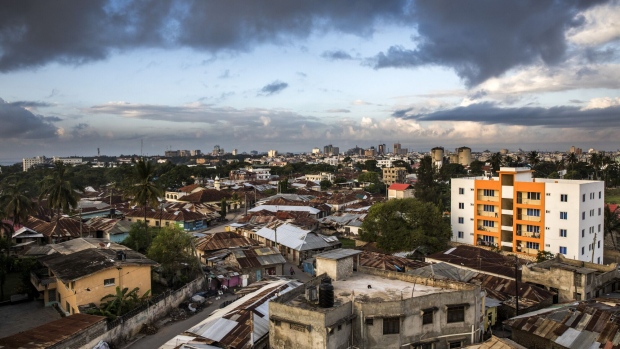Jun 13, 2024
Tax Increases, Higher Spending Plans on East Africa Budget Cards
, Bloomberg News

(Bloomberg) -- East African finance ministers will need to strike a balance between burdening their already heavily indebted nations with more loans and boosting their economies pounded by heavy rains and flooding when they present their spending plans on Thursday.
Kenya, Tanzania, Uganda and Burundi have already signaled that they will increase expenditure funded by fresh borrowings and taxes to bolster their economies.
Kenya, which is considered at high risk of debt distress, plans to collect taxes aggressively to narrow its budget deficit to a 15-year low. Uganda will borrow more from domestic markets after the World Bank froze fresh concessional funding, citing the nation’s anti-LGBTQ laws. Tanzania expects foreign commercial borrowings to jump 42% as it funds ambitious infrastructure projects and prepares for a presidential election next year.
“Markets are open for borrowers, but are expensive,” said Charlie Robertson, head of macro-strategy at FIM Partners. “So tight budgets, tax rises, and less development expenditures are likely to be themes across East Africa.”
Lawmakers in the East African nations have already approved the separate plans. Rwanda, whose finance minister traditionally reads out the budget in tandem with the other East African nations, presented early as the country prepares to hold elections next month.
KENYA
The budget, the second since President William Ruto took office, has an ambitious target of nearly halving the fiscal deficit to 2.9% of gross domestic product in the year through June 2025. This will be achieved by introducing a slew of new taxes on infrastructure bond investors, motor vehicle owners and online marketplace operators.
The new levies that are in line with objectives laid out in an International Monetary Fund program aim at yielding a fifth more in ordinary revenue.
Total expenditure is seen climbing 2% to 3.9 trillion shillings ($31 billion), below a five-year average of about 8%, according to a lawmakers report. Kenya will fill the financing hole through 257.92 billion shillings of net domestic financing and 256.7 billion shillings of net foreign loans.
TANZANIA
Tanzania’s Finance Minister Mwigulu Nchemba is targeting a fiscal deficit of 2.9% of GDP in 2024-25 from an estimated 2.8% in the current period. The nation plans to increase spending by 11% to 49.34 trillion shillings ($18.9 billion).
It aims to borrow 2.98 trillion shillings from external commercial sources from about 2.1 trillion shillings this fiscal year. Priority spending will be on social services and infrastructure projects, such as the renovation and construction of stadiums ahead of a 2027 Africa-wide soccer tournament, and in preparation of local elections in 2024 and a presidential vote next year.
UGANDA
The leading African coffee exporter estimates expenditure will jump to 72.1 trillion shillings ($19.2 billion) in the fiscal year starting July 1. Domestic borrowing will increase 12% to 8.9 trillion shillings from the as Uganda pivots to internal financing sources.
BURUNDI
The nickel producer will boost spending 16% to 4.397 trillion francs ($1.5 billion) in 2024-25 and increase revenue collection by 17% by netting more taxes and introducing new ones such as on palm oil. It will rely on foreign aid to bridge its 456 billion-franc financing gap.
--With assistance from Fumbuka Ng'wanakilala and Desire Nimubona.
©2024 Bloomberg L.P.







